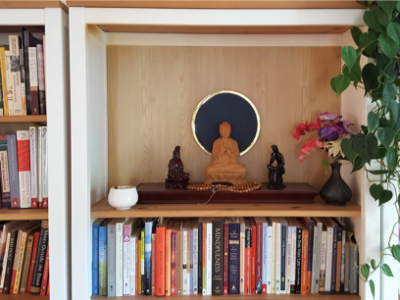Magha Pujwronga | Sangha Day
About This Resource
Details
Magha Pujwronga | Sangha Day
Celebrated by whom?
Magha Puja, also called Sangha Day or Fourfold Assembly Day, is a major uposatha or holy day observed by most Theravada Buddhists. “Fourfold assembly” means all the followers of the Buddha — monks, nuns, and lay disciples, men and women. The day is called Makha Bucha in Thailand, Meak Bochea in Khmer and the full moon of Tabodwe or Tabaung in Burma (Myanmar). It is also celebrated in Cambodia, Laos and Sri Lanka.
When is it?
Magha Puja is celebrated on the first full moon day of the third lunar month, usually sometime in February or March. In 2023, it falls on March 6th.
Context:
On Magha Puja day, lay people gather at temples and monasteries in the morning, offering food to the ordained sangha. Monastics chant the Ovada-Patimokkha Gatha, which summarizes the Buddha’s teachings. At evening time, people participate in candlelight processions. Everyone circumambulates (walks around) the shrine or Buddha image or through a temple three times, once for each of the Three Jewels – The Buddha, the Dharma, and the Sangha. Buddhists around the world celebrate Magha Puja Day with gift exchanges, by lighting oil lamps, chanting, meditating, and attending temple for special observances. The spiritual aims of the day are to do only good things and to purify one’s mind. The practice of the Five Precepts or the practice of renunciation is one of the activities that is observed on Magha Puja Day.
Origin:
This day marks the occasion when 1250 enlightened arhats came to pay homage to the Buddha and he taught them the Ovada-Patimokkha Gatha. This was during the first year of the Buddha’s activity of founding the Sangha and giving Dharma teachings.
Helpful Reading:
- Sangha Day via Tricycle
- The Buddhist Holiday of Magha Puja or Sangha Day, via Learn Religions,
- Everything you need to know about Magha Puja via Sonasia Holiday, Magha Puja –
Approach:
Because this event really celebrates the preciousness of the Sangha, this is a great day to focus on the community, and its value as one of the three jewels. Read and reflect on the words of Thich Nhat Hanh, when he said, “It is possible the next Buddha will not take the form of an individual. The next Buddha may take the form of a community, a community practicing understanding and loving kindness, a community practicing mindful living. And the practice can be carried out as a group, as a city, as a nation.” in his talk entitled, “The Next Buddha May Be a Sangha,” via Inquiring Mind.
This is another great occasion for teaching students the five precepts. Referring to the Ovada-patimokkha sutra, we can focus student’s learning on what the Buddha specifically taught on this day. In this sutra, he spoke of the ideal goals of Buddhism, the principles of Buddhism, and the compassionate method of Buddhism. There are many more details in the 3rd helpful reading link above. Perhaps the best summary is this traditional quote about the essence of what the Buddha taught, which is mentioned in the Ovada-patimokkha sutra, which you can review and study with students:
- Do nothing non-virtuous.
- Practice virtue always.
- Completely tame your own mind.
- These few words are said to summarize all of the Buddha’s teachings.
What is virtue? Review the child-friendly version of the precepts at the bottom of this page, as a way of approaching the idea of virtue from a Buddhist perspective.
Simple Activities to Celebrate Sangha Day
Practice and learn “Dear Friends” from Plum Village’s PDF of 38 Songs of the Sangha
(Audio recording)
DEAR FRIENDS
Dear friends, dear friends,
let me tell you how I feel.
You have given me such treasures,
I love you so.
Love, joy, inner peace,
like a Sunday morning breeze,
oh my dear you are so welcome.
Love give you ease.
Older students and teachers may wish to watch Thich Nhat Hanh’s 20 minute teaching on Sangha and The Beloved Community.
| Traditional Buddhist Precept | MWE Version for Children | |
|---|---|---|
| 1 | “I undertake the training-precept to abstain from intentionally taking the life of beings.” (Pali: Pāṇātipātā veramaṇī sikkhāpadaṃ samādiyāmi.) | Reverence for Life: We are committed to protecting people, animals, plants and minerals from harm. We care for them in a way that we would like to be cared for ourselves. We respect all life. |
| 2 | “I undertake the training-precept to abstain from taking what is not given.” (Pali: Adinnādānā veramaṇī sikkhāpadaṃ samādiyāmi.) | Generosity: We do our best to share and be generous when we think, speak and act. We give compassion to those in need. We always ask when borrowing. We do not take what is not given. |
| 3 | “I undertake the training-precept to abstain from sexual misconduct.” (Pali: Kāmesumicchācāra veramaṇī sikkhāpadaṃ samādiyāmi.) | Body Responsibility: We are respectful of our bodies and the bodies of others. We are committed to learning appropriate ways to take care of our energy and cultivate loving kindness, compassion, joy and inclusiveness. |
| 4 | “I undertake the training-precept to abstain from false speech.” (Pali: Musāvādā veramaṇī sikkhāpadaṃ samādiyāmi.) | Harmonious Speech: We listen deeply and use mindful speech. We speak truthfully using words that inspire confidence, joy, and hope. We speak and listen in a way that can help ourselves and others. |
| 5 | “I undertake the training-precept to abstain from alcoholic drink or drugs that are an opportunity for heedlessness.” (Pali: Surāmerayamajjapamādaṭṭhānā veramaṇī sikkhāpadaṃ samādiyāmi.) | Mindful Consumption: We choose food, drink and activities that are healthy for ourselves and others. We contemplate interdependence and consume in a way that preserves peace, joy, and well-being for all living things. |




